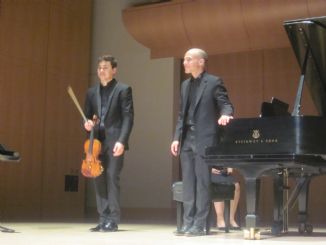|
Symphony
MONUMENTAL MAHLER 5TH IN SO CO PHIL'S SEASON ENDING CONCERT
by Terry McNeill
Sunday, April 14, 2024
Chamber
OAKMONT SEASON CLOSES WITH STRAUSS' PASSIONATE SONATA
by Terry McNeill
Thursday, April 11, 2024
Chamber
MORE GOLD THAN KORN AT ALEXANDER SQ CONCERT
by Terry McNeill
Sunday, April 7, 2024
Choral and Vocal
VIBRANT GOOD FRIDAY REQUIEM AT CHURCH OF THE ROSES
by Pamela Hicks Gailey
Friday, March 29, 2024
TWO OLD, TWO NEW AT THE SR SYMPHONY'S MARCH CONCERT IN WEILL
by Peter Lert
Saturday, March 23, 2024
Chamber
NOT A SEVENTH BUT A FIRST AT SPRING LAKE VILLAGE CONCERT
by Terry McNeill
Wednesday, March 20, 2024
THIRTY-THREE PLUS VARIATIONS AND AN OCEAN VIEW
by Terry McNeill
Saturday, March 16, 2024
Choral and Vocal
A ST. JOHN PASSION FOR THE AGES
by Abby Wasserman
Friday, March 8, 2024
Choral and Vocal
SPLENDID SCHUBERT SONGS IN SANET ALLEN RECITAL
by Terry McNeill
Saturday, March 2, 2024
Chamber
SHAW'S MICROFICTIONS HIGHLIGHTS MIRO QUARTET'S SEBASTOPOL CONCERT
by Peter Lert
Friday, March 1, 2024
|
 |
 Benjamin Beilman and Orion Weiss May 14 in Schroeder Hall |
DEMANDING VIOLIN SONATAS CONQUERED BY BEILMAN-WEISS DUO IN SCHROEDER
by Terry McNeill
Sunday, May 14, 2017
Violinist Benjamin Beilmanís ravishing Mozart performance at last summerís Weill Hall ChamberFest finale lured an enthusiastic crowd to Schroeder Hall May 14 to hear if his secure virtuosity was up to a program of demanding sonatas. He did not disappoint.
With the powerful pianist Orion Weiss in the mix the JanŠcek and Bartok No. 2 Sonatas were the core of a demanding afternoon, with the former perhaps the most memorable. Written in 1922 with echoes of the composerís two string quartets, the four-movement piece reflects anxiety and fear from the period, and Mr. Beilman made the most of the often-confusing changes in rhythm and mood. He was a master of soft phrase endings, sometimes with whispering codicils. The raucous contrasts in the opening con moto turned into bucolic lyricism in the ballada, a movement heard February in Christian Tetzlaffís fine Weill recital.
In the third movement allegretto Mr. Beilmanís interpretation became snarling and pushy, and Mr. Weissís playing was insistent and propulsive. The playing in the adagio finale was more of the same, Mr. Beilmanís slashing and thrusting phrases having the required hard-edged tone, juxtaposed with a plaintive theme in both the piano and violin lines. The diminuendo at the conclusion was beautifully played. It was high-level virtuosity from the duo.
Following intermission Bartokís tumultuous work was heard, and even for the prepared listener it can be a difficult task to embrace. Donít look for long melodic lines in the two movements, as the Hungarian master was interested in unique instrumental effects in a rustic fabric of sound. This is complex music with concentrated fantasy and is mostly atonal, with many slides, portamento, melodic pizzicato and numerous short sections. The violinist and pianist met every challenge including menacing toccata-like playing in the final allegretto where Mr. Beilman seemed to often alter his usual razor-sharp pitch for calculated effects. His high register pianissimo was captivating, and it ended the thrilling but confounding work composed in the same year as the JanŠcek.
The recital opened with chaste and balanced interpretation of Mozartís B-Flat Major Sonata, K. 378. Both musicians were in no rush and the tempos seemed just right, and the tentative opening violin phrase moved to a subtle crescendo. Clearly Mr. Beilman can make changes and swells in volume sound easily natural. Nothing was forced and each thematic line was distinct and perfectly ďMozartian.Ē
Schubertís 11-minute B Minor Rondo, a favorite of violinists, sounded pretty tame after the Bartok, with alternating jolly and peasant sections ending in several deceptive cadences. Itís Schubert in a husky mood and the duoís virtuosity plumbed every nuance in the piece.
An ovation recalled the duo to the stage for a one encore, Kreislerís chestnut Liebeslied (Loveís Sorrows). It was perfectly played but perhaps without the last ounce of Viennese whipped cream that the composerís recordings capture.
|

